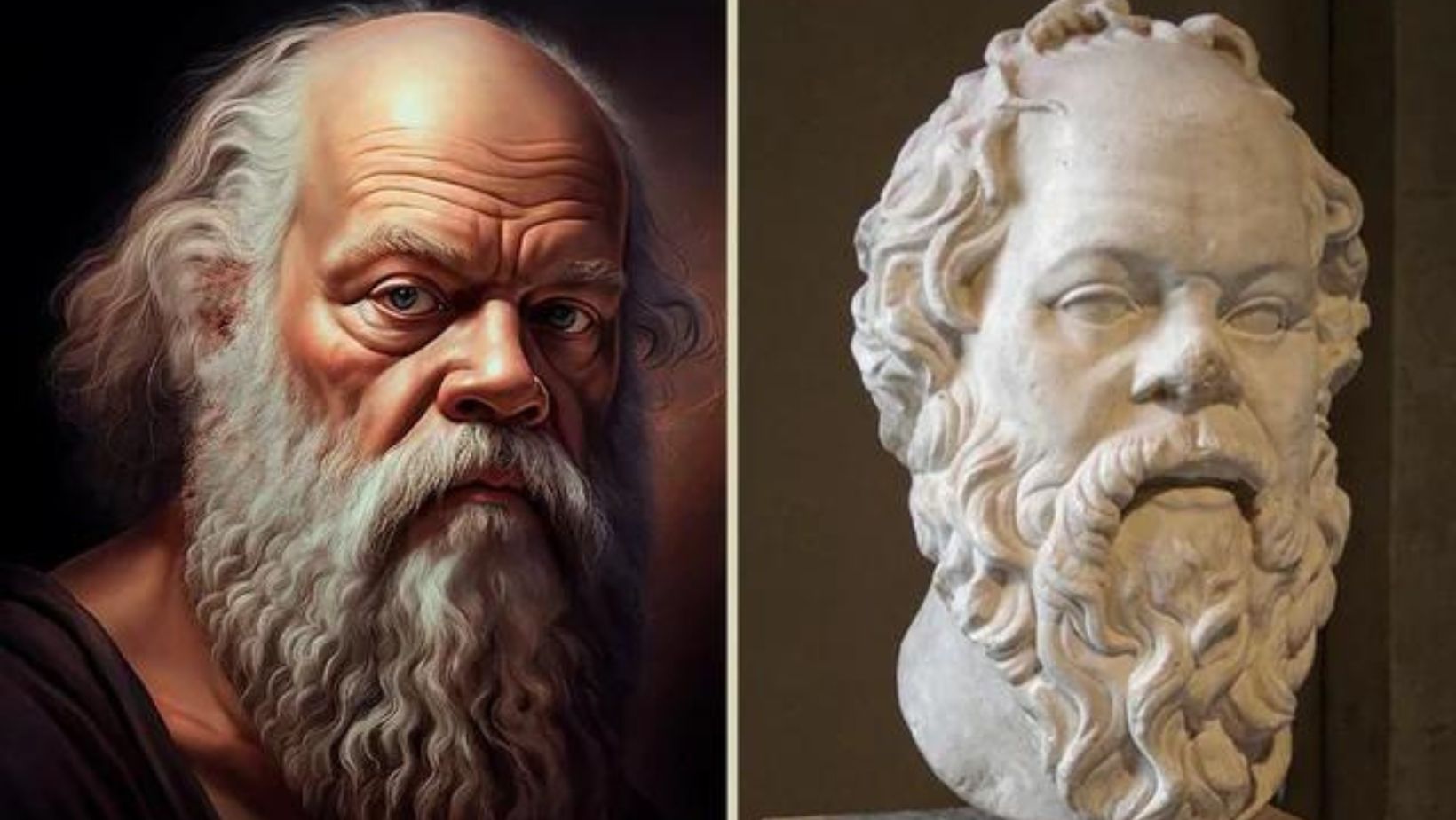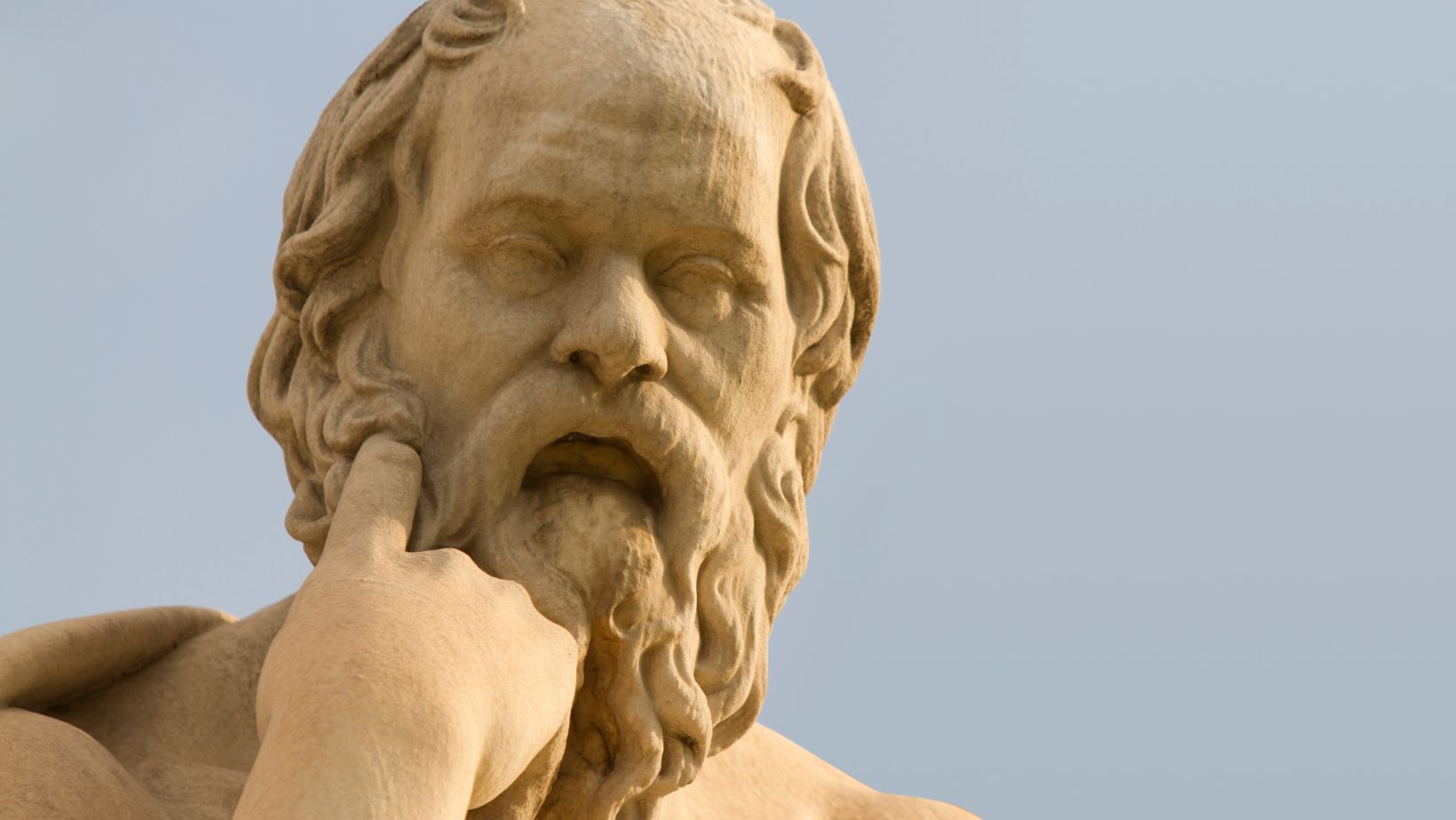So, why do folks constantly buzz about Socrates when they talk Western philosophy? He didn’t just sit around thinking about the deep mysteries of life – his method was downright groundbreaking. From wandering the streets of Athens engaging with fellow citizens to challenging norms with his relentless questioning, Socrates contributions to philosophy have shaped how we understand knowledge, virtue, and the very essence of an examined life. We’re not just talking about history here; we’re diving into the deep roots of critical thinking that shape so much of how we see the world today.
Table of Contents:
- The Life and Teachings of Socrates
- Socratic Method and Philosophical Dialogues
- Key Philosophical Concepts and Ideas
- Socrates’ Trial and Execution
- The Influence of Socrates on Western Philosophy
- Conclusion
The Life and Teachings of Socrates: Socrates Contributions to Philosophy

Socrates, the enigmatic figure that looms large over the world of Western philosophy, was a man of profound wisdom and unrelenting curiosity. Born in Athens in the 5th century BCE, he left an indelible mark on the intellectual landscape of ancient Greece and beyond.
Socrates was born into a humble family in Athens, Greece. His father, Sophroniscus, was a stonemason, while his mother, Phaenarete, worked as a midwife.
Socrates’ Pursuit of Wisdom: Socrates Contributions to Philosophy
From a young age, Socrates displayed an insatiable appetite for knowledge and a relentless pursuit of wisdom. He believed that the path to human wisdom lay in the examination of one’s own life and the lives of others. This conviction would shape the course of his philosophical journey and earn him a place among the greatest thinkers in history.
Socrates was known for his unique approach to philosophical discourse. He sought to challenge conventional beliefs and encourage critical thinking among his interlocutors.
Questioning Conventional Beliefs
Socrates’ method of inquiry often involved asking probing questions that exposed the limitations and inconsistencies in people’s beliefs. He believed that by subjecting ideas to rigorous scrutiny, one could arrive at a clearer understanding of human nature and the essence of a life worth living. This approach would later become known as the Socratic method, a cornerstone of philosophical inquiry.
Socratic Method and Philosophical Dialogues: Socrates Contributions to Philosophy
At the heart of Socrates’ philosophical legacy lies the Socratic method, a form of inquiry that has shaped the course of Western thought for centuries. This method, characterized by its emphasis on questioning and dialogue, continues to inspire and challenge thinkers to this day.
The Socratic method is built upon the art of questioning. Socrates believed that by asking the right questions, one could uncover the truth and expose the limitations of our knowledge. He would engage in a series of probing questions, each one designed to challenge his interlocutor’s assumptions and beliefs.
Engaging in Philosophical Discussions
Socrates’ approach to philosophy was inherently dialogical. He was convinced that the only way to truly grasp wisdom was by diving into conversations and experiences with other people. By participating in philosophical discussions, Socrates sought to stimulate critical thinking and encourage his fellow citizens to examine their own lives and beliefs.
The goal of the Socratic method was not merely to win arguments or demonstrate intellectual superiority. For Socrates, chatting it up wasn’t just talk; it was his way of digging deep and getting to the heart of tricky topics.
The Importance of Self-Examination: Socrates Contributions to Philosophy
Central to the Socratic method is the idea that an unexamined life is not worth living. Socrates believed that true wisdom begins with self-knowledge and that the path to understanding the world around us starts with understanding ourselves. By engaging in rigorous self-examination, we can uncover our own biases, limitations, and areas for growth.
Key Philosophical Concepts and Ideas
Socrates’ philosophical contributions extend far beyond his method of inquiry. Through his teachings and the accounts of his students, Socrates introduced a range of profound ideas that continue to shape our understanding of ethics, knowledge, and the human condition.
Socrates really had a thing for focusing on what it means to be good and virtuous. He was convinced that the real win in life was all about leading a life full of good deeds and finding true satisfaction. In his famous defense speech, known as the Apology, Socrates argues that the pursuit of virtue should be the highest priority for all individuals.
The Nature of Justice
Socrates was deeply interested in the nature of justice and what it means to live a just life. He took the old ideas of justice and flipped them on their head, suggesting that real justice goes beyond just sticking to laws or what society expects. Instead, he believed that justice is an internal state of the soul, a harmony between reason, spirit, and desire.
Socrates placed great emphasis on the importance of self-knowledge. He famously declared that “the unexamined life is not worth living,” suggesting that true wisdom begins with a deep understanding of oneself. Socrates believed that by engaging in rigorous self-examination, we can uncover our own ignorance and limitations, and begin the journey towards genuine knowledge.
The Immortality of the Soul: Socrates Contributions to Philosophy
Socrates really believed our souls don’t just disappear after we die, sparking conversations that would shape the way Western cultures think about religion and philosophy for ages to come. He argued that the soul is distinct from the body and that it continues to exist after death. This belief was central to his understanding of the afterlife and the ultimate purpose of human existence.
Key Takeaway: Socrates Contributions to Philosophy
Socrates revolutionized philosophy with his relentless questioning and the Socratic method, teaching us that wisdom starts with admitting our own ignorance. He championed self-examination, arguing an unexamined life isn’t worth living, and believed in pursuing virtue above all else.
Socrates’ Trial and Execution: Socrates Contributions to Philosophy
The trial and execution of Socrates took place during a tumultuous time in Athens’ history. The city-state was reeling from the aftermath of the Peloponnesian War, a long and devastating conflict with Sparta that had ended just a few years prior.
In this climate of political instability and social unrest, Socrates found himself facing serious charges. He was accused of corrupting the youth of Athens and failing to respect the gods of the city.
The specific charges leveled against Socrates were twofold. First, he was accused of not believing in the gods recognized by the state and introducing new deities. Second, he was charged with corrupting the youth of Athens through his teachings.
His famous Socratic method involved asking probing questions to expose the flaws in others’ arguments and beliefs.
Socrates’ Defense and Refusal to Compromise
Even though he was up against some heavy accusations, Socrates didn’t back down and put up a lively defense. In Plato’s Apology, a record of Socrates’ defense speech, he is portrayed as defiant and unwilling to compromise his principles.
Socrates argued that he was not guilty of the charges and that his philosophical inquiries were aimed at promoting wisdom and virtue. He famously stated that “the unexamined life is not worth living.”
The Aftermath and Legacy: Socrates Contributions to Philosophy
Despite his eloquent defense, Socrates was found guilty by a narrow margin and sentenced to death. His execution was delayed for 30 days due to a religious festival.
During this time, Socrates’ friends and disciples urged him to escape and go into exile. However, Socrates refused, arguing that it would be contrary to his principles to disobey the laws of Athens.
On the day of his execution, Socrates calmly drank a cup of hemlock, the poisonous substance used for executions. Plato, it seems, left us in a way that was as calm and noble as the life he led.
Socrates’ trial and death had a profound impact on his followers and the development of Western philosophy.
The Influence of Socrates on Western Philosophy

Although he wrote nothing himself, his ideas and methods had a profound impact on his contemporaries and successors.
You can see his mark on so many thinkers who came after him, walking a path he blazed.
Before Socrates, Greek philosophy was primarily concerned with understanding the natural world. Philosophers like Thales, Anaximander, and Anaximenes sought to explain the origins and nature of the universe.
Socrates, however, turned his attention inward, to the study of human nature and morality. He believed that the most important knowledge was self-knowledge and that the unexamined life was not worth living.
This pivot in thinking really set the stage for what we now recognize as Western philosophy.
Inspiring Plato and Aristotle
Two of Socrates’ most famous students were Plato and Aristotle, who would go on to become towering figures in the history of philosophy.
Plato was deeply influenced by Socrates’ methods and ideas. His famous dialogues feature Socrates as the main character, engaging in philosophical discussions with various interlocutors.
Aristotle, who studied under Plato at the Academy, was also influenced by Socrates, though he would go on to develop his own distinctive philosophical views. Aristotle’s writings on logic, metaphysics, ethics, and politics laid the foundation for much of subsequent Western thought.
Socrates’ influence extended beyond his immediate students.
They developed their own distinctive doctrines, but all were shaped by the Socratic legacy.
Socrates’ Enduring Impact on Modern Thought
Socrates’ impact on Western philosophy is still felt today. His emphasis on critical thinking, his commitment to ethical inquiry, and his willingness to question received wisdom continue to inspire philosophers and thinkers.
In the 20th century, existentialist philosophers like Jean-Paul Sartre and Albert Camus drew on Socratic themes in their writings, emphasizing the importance of individual choice and the need to create meaning in a seemingly absurd world.
The Socratic method, with its emphasis on dialogue and critical inquiry, remains a powerful tool for philosophical investigation.
In a sense, every philosopher who engages in critical thinking and questioning of received beliefs is following in Socrates’ footsteps.
Key Takeaway: Socrates Contributions to Philosophy
Socrates turned the tide of philosophy from natural world studies to probing human morality and wisdom, inspiring countless thinkers with his unwavering commitment to questioning life’s big questions. His trial and execution highlighted his deep dedication to principles over safety, shaping Western thought forever.
Conclusion: Socrates Contributions to Philosophy
So there you have it. It turns out that centuries ago, a man roamed Athens asking probing questions that would lay down the groundwork for all future thought explorers. The journey through Socrates contributions to philosophy has shown us not only his methods but also their profound influence on everything from ethics to politics and education.
This isn’t merely historical trivia; these are insights shaping lives today – urging us towards self-reflection and pursuit of genuine knowledge.
In our fast-paced world where information comes at us like arrows in battle, pausing for such reflection might seem quaint or even obsolete. But if anything can be learned from this dive into ancient wisdom, let it be this: true progress requires looking back as much as charging forward—pondering deeply over simple yet eternal queries ‘What is virtue?’ ‘Can morality be taught?’ These aren’t old hat; they’re timeless hats fitting heads then and now alike.

